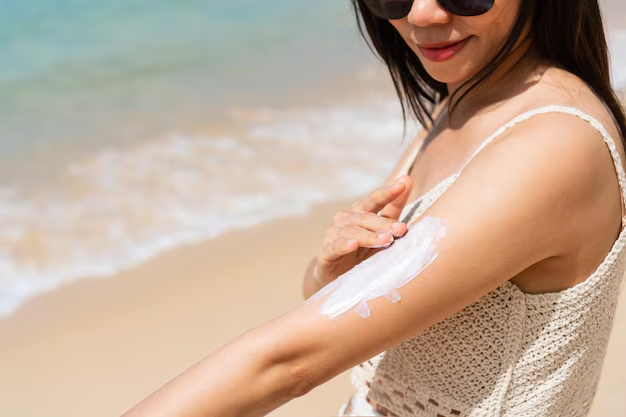Is Your Sunblock Putting You at Risk? Understanding the Potential Links to Cancer
When it comes to protecting our skin from the sun's harsh rays, sunblock often tops the list of go-to solutions. But have recent claims shed light on a potentially darker side to this protective lotion? Could sunblock, in an ironic twist, actually increase the risk of cancer? Let’s delve deep into this topic to find out if this concern holds any ground and what this means for you and your family.
The Promise of Sunblock: A Double-Edged Sword?
Sunblock vs. Sunscreen: Which Shield Do You Choose?
Before diving into whether sunblock is harmful, it's crucial to understand the distinction between sunblock and sunscreen. While the terms are often used interchangeably, they function differently:
- Sunblock physically blocks or reflects UV radiation, sitting on top of the skin.
- Sunscreen absorbs UV rays through chemical filtration, preventing them from penetrating the skin.
While both provide protection, the ingredients and mechanisms vary, creating discussion about safety and effectiveness.
The Ingredients in Question
Chemicals in the Spotlight
The essence of the debate about the safety of sunblock lies in its ingredients. Some chemical components have raised red flags in recent years:
Oxybenzone and Octinoxate
Oxybenzone is a common ingredient found in many sunblocks known for its effectiveness in filtering harmful UV rays. However, studies suggest that oxybenzone can be absorbed into the bloodstream. The same goes for octinoxate. Concerns center on their potential to disrupt hormones and trigger allergic reactions.
Zinc Oxide and Titanium Dioxide
As mineral-based ingredients, zinc oxide and titanium dioxide serve as the active components in many physical sunblocks. These are often regarded as safer options since they sit on the skin’s surface rather than being absorbed. Yet, the production and processing of these minerals can potentially lead to concerns regarding nanoparticles, though current research suggests minimal risk when these particles remain coated and stable.
Does Sunblock Really Cause Cancer?
Weighing the Evidence
The theories around sunblock potentially causing cancer predominantly hinge on two themes: chemical absorption and free radical formation.
The Debate on Absorption
Recent studies have highlighted that some chemical sunscreen agents can indeed enter the bloodstream. However, it's essential to emphasize that absorption alone doesn't inherently mean danger or cancer risk. Regulatory bodies continue to evaluate these findings, ensuring safety standards are met.
Free Radicals and Photodegradation
Certain sunscreen chemicals, when exposed to UV radiation, can degrade into free radicals, known for causing skin damage and potentially leading to cancer development. Fortunately, modern formulations often include antioxidants to counteract these effects, although concerns persist.
The Other Side: Potential Risks of Going Without
It's easy to fixate on potential risks, but it's equally vital to address the consequences of avoiding sunblock. Unprotected UV exposure is a primary risk factor for skin cancer, including malignant melanoma.
Natural Alternatives: Are They Enough?
Some turn to natural options like coconut oil or shea butter, but these lack robust UV protection. Without proper protection, you’re susceptible to sunburn, premature aging, and a higher risk of skin cancer.
A Balanced Approach to Sun Safety
Empowering Choices for Skin Health
Rather than focusing purely on possible risks, creating a sun protection strategy that blends multiple approaches is key.
Top Tips for Safe Sun Protection
- Choose Broad-Spectrum Protection: Ensure your sunblock protects against both UVA and UVB radiation.
- Check the SPF: Opt for SPF 30 or higher for effective protection.
- Reapply Frequently: Don’t forget to reapply every two hours and after swimming or sweating.
- Don’t Rely on Sunblock Alone: Wear protective clothing, hats, and sunglasses, and seek shade during peak sun hours.
Navigating the Labyrinth of Sunblock Ingredients
For those concerned about specific ingredients:
- Seek Mineral Options: Look for zinc oxide and titanium dioxide in non-nano formulations.
- Consider Fragrance-Free: To avoid skin irritants.
- Patch Test New Products: To check for personal sensitivities.
Staying Updated with the Science
Scientific understanding of sunblock and its potential links to cancer is ever-evolving. Staying informed by consulting reputable sources and dermatologists can help you make educated decisions about your skin health.
The bottom line is that while certain concerns about sunblock ingredients exist, current evidence strongly supports the use of sun protection as a key measure to prevent skin cancer. With strategic choices and informed decisions, you can enjoy the sun safely.
Key Takeaways 🌞
- Sunblock vs. Sunscreen: Know the difference for tailored sun care.
- Ingredient Awareness: Watch for oxybenzone and octinoxate but seek approved & mineral-based protections.
- Balanced Protection: Use a mix of protective gear, limited sun exposure, and reapplication of sunscreen.
- Stay Informed & Safe: Follow updates on sun protection research and practice comprehensive sun safety strategies.

Related Articles
- Are Breast Cancer Lumps Painful
- Are Chills a Sign Of Cancer
- Are Colon Spasms a Sign Of Cancer
- Are Lytic Lesions Always Cancer
- Are Polyps Cancer
- Can a Blood Test Detect Cancer
- Can a Ct Scan Detect Cancer
- Can a Dexa Scan Show Cancer
- Can a Gastric Emptying Scan Show Cancer
- Can a Lung Biopsy Cause Cancer To Spread
